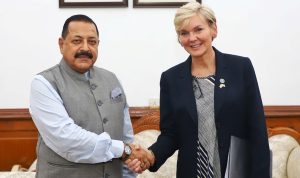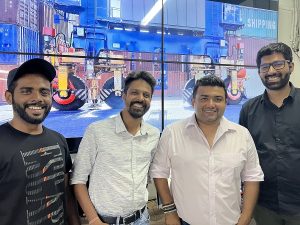MeitY Quantum Computing Applications Lab Boosts Scientific and Industry Focus for its Second Cohort

MeitY Quantum Computing Applications Lab Boosts Scientific and Industry Focus for its Second Cohort
Consider addressing computational problems that traditional computers cannot, such as creating truly random numbers free of human bias at fast speeds and in real time. That is the promise and potential of quantum computing, which uses quantum mechanics laws to improve the way and speed with which information is processed.
In India, the Quantum Computing Applications Lab (QCAL), a collaboration between the Ministry of Electronics and Information Technology (MeitY) and Amazon Web Services (AWS), announced that the Office of the Principal Scientific Adviser (PSA) to the Government of India, as well as Indian advanced technology consultancies and AWS Partners Mphasis and Fractal, will strengthen its scientific research and industry focus for its second cohort.
The Office of the PSA, with its scientific expertise, will support the vision of the MeitY QCAL through outreach and engagement with academia, research institutions, and startups. AWS Partners Mphasis and Fractal–two companies at the forefront of developing quantum computing capabilities–will extend their support to MeitY and AWS to evaluate research proposals and mentor the research applicants in the second cohort. The MeitY QCAL will accept applications for the second cohort later this month.
The MeitY QCAL was established in January 2021 to give scientific, academic, and developer communities with access to a quantum computing development environment compatible with the India government’s research and technology aspirations. The latest addition of scientific and technology organizations such as the Office of the PSA, Mphasis, and Fractal will provide the MeitY QCAL with cross-disciplinary collaboration to provide researchers, academia, and startups involved in the QCAL with greater impetus, direction, technical support, and mentoring to explore quantum computing research.
The MeitY QCAL is India’s sole effort of its sort, providing quantum computing as a cloud service to government ministries and departments, academics, scientists, universities, and developers to enable improvements in areas such as manufacturing, healthcare, agriculture, and aerospace engineering. The MeitY QCAL is also the first quantum computing applications lab on AWS to support a government’s science and technology mission at a country level.
“The core mission of MeitY is to identify and deploy technologies promoting innovation and discovery to help India advance and achieve a more sustainable future. Quantum computing has the extraordinary potential to help countries leapfrog technology generations, achieve scientific leadership and deliver answers to complex economic and social challenges,” said Abhishek Singh, President and Chief Executive Officer (CEO) of the National e-Governance Division (NeGD), MeitY. “The MeitY initiative will augment India’s ongoing efforts in developing quantum computing applications.”
Empowering the scientific community with quantum computing capabilities
The MeitY QCAL provides free and on-demand access to quantum computing hardware, simulators, and programming tools via Amazon Braket. This allows scientists and developers to create algorithms, run complex simulations, and undertake experiments. Amazon Braket includes simulators for developers to evaluate their work on standard computing environments before executing apps on quantum computers. The service enables simpler and faster experimentation, which is significant because many of today’s quantum workloads are still in their infancy, and this flexibility allows clients to fine-tune their ideas, iterate, and scale future initiatives.
For its first cohort, the MeitY QCAL received research proposals from premier academic institutes across India, such as Indian Institutes of Technology (IIT), Indian Institutes of Science (IISc.), Indian Institutes of Science Education and Research (IISER), Birla Institute of Technology and Science (BITS), National Institute of Technology (NIT), and Indian Statistical Institute (ISI). These proposals focused on topics such as quantum computation, quantum information, exploration of quantum algorithms, quantum simulators/hardware, quantum machine learning, optimization problems, and quantum systems for new application domains such as drug discovery and materials. Currently, 16 of these proposals have been accepted by MeitY QCAL, and will receive AWS credits to use Amazon Braket, and technical and programmatic support from AWS.
“We are pleased to see the addition of more scientific and technical capabilities, and industry insight for the MeitY QCAL through the Office of the PSA, Mphasis, and Fractal, towards the goal of nurturing a stronger quantum computing community in India. This engagement will empower the research, academic, and startup community with valuable expertise, experience, and best practices, and enable them to boldly experiment with quantum technology,” said Kanishka Agiwal, Head of Service Lines, for the public sector for AWS India and South Asia, Amazon Internet Services Private Limited (AISPL). “The first cohort of 16 proposals accepted by the MeitY QCAL will benefit from the breadth and depth of AWS as they undertake their research and innovation in quantum computing, and we can’t wait to see where this game-changing technology will take them.”
AWS is also a founding member of the Quantum Ecosystems and Technology Council of India (QETCI), to help develop the quantum computing community, and accelerate the use of quantum computing in India.
Accelerating quantum computing through expanded collaboration
Scientists working in quantum computing are developing quantum algorithms that solve computational tasks significantly quicker than binary logic algorithms. Grover’s method is an example of a quantum search tool created by computer scientist Lov Grover that can search databases quicker than a traditional computer. A quantum computer can perform tasks that would take a regular computer one million steps in roughly 1,000 steps. Quantum algorithms can be used to create new systems to solve problems in artificial intelligence, materials science, medical research, supply chain optimization, and other areas. The MeitY QCAL cooperation brings together industry, government, and academia in order to harness the power of quantum and find creative solutions to some of the world’s most pressing challenges.
“As MeitY continues to be the leading force behind the Government of India’s efforts to promote inclusive and sustainable growth of the electronics and IT industry, an emphasis on research and development innovation, and ensuring secure cyberspace will be of utmost relevance. Through the creation of the Quantum Computing Applications Lab in collaboration with AWS, MeitY has taken an important step to identify quantum computing problem statements faced by ministries, other government agencies, research institutions, and academia,” said Professor Ajay Kumar Sood, Principal Scientific Adviser to the Government of India. “Democratizing quantum computing by facilitating no-cost access to necessary hardware and software will aid our researchers and developers in their endeavor of research and discovery. My sincerest wishes to MeitY on this very fruitful collaboration with AWS.”
“We are delighted to collaborate with the Government of India, MeitY QCAL, and AWS to build and enhance the quantum computing community. As one of the frontrunners in quantum computing in India today, we will be leveraging our industry expertise and quantum capabilities in building a thriving quantum technology-driven economic sector. At Mphasis, we aim to utilize the synergy between academia, industry, and government to drive the commercialization of scientific discoveries in quantum computing. With this initiative, we intend to make a concentrated effort to aid the tech investments of the Government of India and support the research community in the country to develop niche quantum computing applications,” said Srikumar Ramanathan, Chief Solutions Officer of Mphasis.
“Quantum computing will accelerate scientific and technological breakthroughs over the next decade by significantly expanding computational capabilities. Classical computing provided the major thrust for the information age, and quantum computing has the potential to play a similar role in the age of intelligence and artificial intelligence that we have entered,” said Srikanth Velamakanni, Co-founder, Group Chief Executive, and Vice Chairman of Fractal. “India has the opportunity to lead the world in quantum computing by bringing together innovative research institutions, deep-tech companies, and entrepreneurs. We look forward to contributing to this vibrant quantum computing community in India.”
Collaborating to make quantum computing more accessible
While the effort to democratize quantum computing is still in its early stages, scientists and researchers are well on their way to put this powerful technology to use in everyday life. AWS’s collaboration with MeitY is an example of a public-private partnership that aids in the acceleration of innovation and the development of new disruptive computing capabilities. The Office of the PSA’s participation in the MeitY QCAL, along with Mphasis and Fractal, aims to improve the quality of research proposals while also broadening the research scope through enhanced collaboration between the scientific community and industry.





